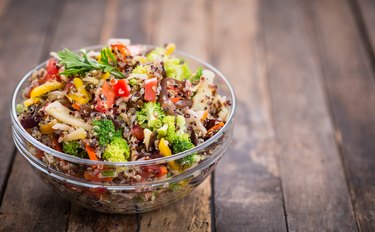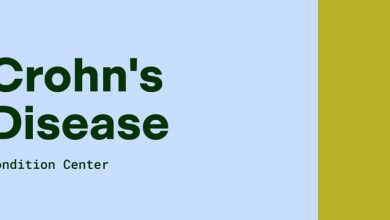5 Benefits of the Nutritarian Diet — and 4 Big Drawbacks

pilipphoto/iStock/GettyImages
With keto, intermittent fasting, the GOLO diet and more, you’d think there isn’t room for yet another trendy eating style, but alas, there is. Enter the Nutritarian Diet, which emphasizes plant-based meals — and knowing the Nutritarian Diet’s pros and cons can help you decide if it’s right for you.
But what is this new-ish diet, and what does it entail? And will it actually help you move the number on the scale? Here’s our Nutritarian Diet review, including how it works, the pros and cons and whether you should try it.
What Is the Nutritarian Diet?
The eating plan was created by Joel Fuhrman, MD, a family doctor who has published a number of books on diet and health. And according to U.S. News’ reporting, the diet itself is based on four core principles:
- Nutrient density: Paying attention to the concentration of nutrients per calorie of food
- Nutrient adequacy: Getting all of the nutrients your body requires
- Toxin avoidance: Limiting chemicals, toxins and other harmful substances
that can be found in certain foods - Hormonal favorability: Opting for low-glycemic-index foods and limiting animal
proteins to promote favorable hormone levels
What You Can (and Can’t) Eat on the Nutritarian Diet
The dos and don’ts of the diet are pretty clear: The Nutritarian “Eat to Live” program has its own food pyramid, along with these tips to get you started if you’re new to the diet, per the website:
- Eat your G-BOMBS (Greens,
Beans, Onions, Mushrooms, Berries and Seeds). - Avoid snacking.
- Just say no to salt, sugar or oil that’s added to food.
- Replace one meal a day
with a salad.
- Vegetables: These make up the base of the food pyramid. Half should be cooked and half
should be raw. In total, vegetables should make up 30 to 60 percent of your
total calories for the day. - Fresh fruits: Fruit should make up 10 to 40 percent of
your total calories each day. - Beans and legumes: Legumes should make up 10 to 40 percent of
your total calories each day. - Seeds, nuts, avocados: These foods with beneficial fat should make up 10 to 40 percent or less of
your total calories for the day. - Whole grains and potatoes: These foods should account for 20 percent or less of your total daily
calories.
- Tortillas
- Coarsely-ground or sprouted whole-grain
breads or cereals - Tofu
- Tempeh
- Limited amounts of animal products
Foods to Limit
The following foods should be limited to less than 10 percent of your total calories:
- Eggs
- Oil (even olive oil)
- Dairy products
- Wild or
naturally raised animal products like meat and fish
Foods to Avoid
The diet recommends steering clear of the following products as much as possible:
- Sugar and other sweeteners
- Commercial and processed meats
- Cheese
- Processed foods
- Added salt
Daisy-Daisy/iStock/GettyImages
Given the diet’s focus on eating minimally processed, nutritious foods while also cutting back on added sugars, fats and salt, it’s possible that you’ll lose weight on the plan, according to January 2020 research in the American Journal of Lifestyle Medicine.
Nutritarian Diet Pros
The Nutritarian Diet has its pros and cons. Here are some potential perks of the program:
1. It Encourages Nutritious Eating
The eating style emphasizes plant-based, minimally processed and nutrient-dense foods like fruits and vegetables, all of which support overall wellbeing, according to the Mayo Clinic.
As a bonus, these foods are packed with fiber, an essential nutrient that helps promote good digestion and normalizes bowel movements, according to the Mayo Clinic. Fiber can also be beneficial for your heart health and blood sugar levels (more on those later).
2. It May Support Heart Health
High-fiber foods like produce, beans, legumes and whole grains may help lower cholesterol, blood pressure and inflammation, which all can contribute to healthy heart functioning, per the Mayo Clinic.
Indeed, an October 2015 study in the American Journal of Lifestyle Medicine found that following the Nutritarian Diet — also referred to as a nutrient-dense, plant-rich diet — helped lower people’s blood pressure, cholesterol and triglyceride levels, all of which may decrease risk for cardiovascular disease.
3. It Can Help Regulate Blood Sugar
A high-fiber diet can also help regulate digestion to avoid blood sugar spikes, according to the Mayo Clinic.
The diet has likewise been linked to better glycemic control — in other words, more stable blood sugar levels — in people with diabetes, according to the 2020 American Journal of Lifestyle Medicine research.
As mentioned above, the diet’s emphasis on whole plant foods and lack of processed goods may all support weight loss, according to the Mayo Clinic.
The 2015 American Journal of Lifestyle Medicine research also found that following an eating program similar to the Nutritarian Diet led to sustained weight loss in people with obesity.
Tip
Regular exercise is also an important component of any weight-loss plan, according to the Mayo Clinic, so consider adding physical activity to your nutritarian lifestyle.
5. It May Lower Your Risk for Chronic Disease
Altogether, these potential benefits may help decrease your risk for developing chronic diseases like cancer, heart disease and diabetes, according to the 2020 American Journal of Lifestyle Medicine research.
Nutritarian Diet Cons
As stated, Dr. Fuhrman’s diet has its pros and cons. Here are the potential drawbacks:
1. It Limits Certain Nutritious Foods
The diet limits beneficial foods like fish and olive oil. Both foods are staples of the Mediterranean diet, which experts and research have deemed one of the best diets for overall wellbeing due to its non-restrictive guidelines and heart-healthy ingredients, according to the Mayo Clinic.
These foods are also rich in beneficial fats and omega-3s, both of which can support heart health, per the American Heart Association. But instead, the Nutritarian Diet encourages getting these nutrients through supplements, according to the website.
Despite this suggestion, however, it’s really best to fulfill your nutritional needs with whole foods, not supplements, per the Mayo Clinic.
Tip
Talk to your doctor before trying any supplement, as the FDA doesn’t require these products to be proven safe or effective before they’re sold, so there’s no guarantee that any supplement you take is safe, contains the ingredients it says it does or produces the effects it claims.
2. It May Not Be Sustainable
Because the diet restricts certain food groups and requires calorie budgeting, it may not be easy to stick to in the long run, per the Mayo Clinic.
Similarly, diets that are restrictive, boring or don’t include foods you love can be hard to follow in the long term, according to the Mayo Clinic. And if a diet isn’t sustainable, it’s not likely you’ll maintain weight loss.
4. It Can Come at a Cost
The diet’s website encourages buying a membership, which gives you access to meal plans, events, a health tracker and more. But it comes at a cost, with monthly subscriptions ranging from about $8 to $60, or the option for a lifetime membership for $4,000.
And that’s not to mention the additional cost of any of Dr. Fuhrman’s books, supplements or food products, which can further drive up the bill.
Here’s a one-day Nutritarian meal plan to help you get started:
Breakfast
- Avocado Green Smoothie from Love & Zest
- Sweet Potato Toast (4 ways) from Eating Bird Food
Lunch
- Thai Butternut Quinoa Salad from Dishing Out Health
- A cup of mixed berries
Dinner
- Italian pasta salad (omit the olive oil) from Feel Good Foodie
- Black Bean Salad with Corn from Real Food Whole Life
The Bottom Line
The Nutritarian Diet has pros and cons: On one hand, its emphasis on whole plant foods can help support heart health, stable blood sugar levels, weight loss and may even lower your risk for chronic disease.
And while the Nutritarian Diet doesn’t have side effects per se, there are certain drawbacks. It limits some nutritious food groups, which can be restrictive and hard to maintain, and potentially lead to weight regain. What’s more, certain elements of the program can get pricey.
Your best bet? Talk to your doctor about the right eating plan for you and your health needs. You can also explore other, less-restrictive eating styles that are backed by scientific research, like the Mediterranean diet.



